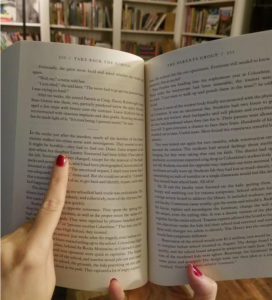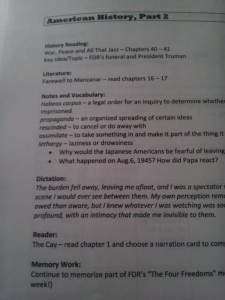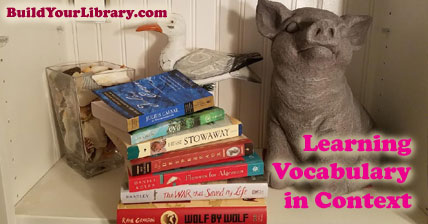Learning Vocabulary in Context
March 27, 2017
“I would have children taught to read before they learn the mechanical arts of reading and writing… A child does not lose by spending a couple of years in acquiring these because he is meanwhile “reading” the Bible, history, geography, tales, with close attention and a remarkable power of reproduction, or rather, of translation into his own language; he is acquiring a copious vocabulary and the habit of consecutive speech. In a word, he is an educated child from the first, and his power of dealing with books, with several books during the course of the morning’s “school,” increases with age.” – Charlotte Mason
A wide vocabulary is a necessity to success in life. It will improve your child’s ability to understand other peoples ideas, and to be able to read extensively (and fully comprehend what they read). It will also help them to articulate their thoughts clearly to others. But I’m convinced that you do not need to purchase any additional resources in order to build your child’s vocabulary. All you need are well-written books. That’s it! I’m willing to bet you already have a library card and/or a well stocked home library.
You can easily develop your child’s vocabulary through great literature. When they learn a new word in context, and see it repeatedly over time, they’ll retain it and add it to their own vocabulary. Learning new words in context just makes sense. The words will come alive within a story and burrow into their mind.
For example – if I just asked my child to randomly define this list of words:
-
-
- ominous
- perilous
- venture
- slither
-
they would do the assignment, but within a few days they’ll have probably forgotten those words entirely. But, if they were to read this wonderful passage:
“From there it’s a simple matter of entering the Mountains of Ignorance, full of perilous pitfalls and ominous overtones – a land to which many venture but few return, and whose evil demons slither slowly from peak to peak in search of prey.”
– The Phantom Tollbooth
Suddenly, all of those words come to life and make sense. Now the definitions have a deeper and illustrated meaning beyond their standard dictionary entry. The words have a purpose. They will more easily become usable in their daily speech the more times they are heard in a good story.
 Even before your child learns to read, you can begin to develop their vocabulary by reading to them the best literature you can find. But don’t just stop there — build your own vocabulary by peppering your every day chatter with big, delicious words. Instead of saying that you enjoy your meal, you might say that dinner is “scrumptious.” Or instead of asking your child to be nice, you could ask them to be more “courteous”. And rather than calling something beautiful, you might say it’s “ravishing” or “stunning.” I’m a big believer in not talking down to children. Don’t be afraid of using big words — dialogue with them about anything and everything, then explain when you use a strange word that they might not understand.
Even before your child learns to read, you can begin to develop their vocabulary by reading to them the best literature you can find. But don’t just stop there — build your own vocabulary by peppering your every day chatter with big, delicious words. Instead of saying that you enjoy your meal, you might say that dinner is “scrumptious.” Or instead of asking your child to be nice, you could ask them to be more “courteous”. And rather than calling something beautiful, you might say it’s “ravishing” or “stunning.” I’m a big believer in not talking down to children. Don’t be afraid of using big words — dialogue with them about anything and everything, then explain when you use a strange word that they might not understand.
So how do I use the vocabulary words that come listed each day in the Build Your Library instructor’s guide?
For most of the day’s assigned literature (or read aloud), I offer a list of vocabulary words that I think will challenge  your child. In the early years, I encourage you to just go over those words orally with your child, either before or after the reading. Keep it simple – just read over the word and the definition, maybe talk about how it was used in the story, or why the author might have chosen that particular word.
your child. In the early years, I encourage you to just go over those words orally with your child, either before or after the reading. Keep it simple – just read over the word and the definition, maybe talk about how it was used in the story, or why the author might have chosen that particular word.
With an older child, you might want to do a bit more. Some things that I’ve done over the years:
Write a few of the vocabulary words on a small white board or sheet of paper and just let them look it over before the reading. Let them guess what the words might mean. Then, after the reading, have them look at their guesses and decide whether they were right or wrong. Talk about what the real meaning of the word is and have them write the correct definition.
Give your child the vocabulary words to define after the reading, then ask them to write them in an original sentence. Be careful not to do this too often, though, as it can quickly become tedious. I wouldn’t do this more than once a week.
You could also play computer games with the vocabulary words at Spelling City or Quizlet, which are both free.
Maybe your child would enjoy “collecting” new words. Give them a lovely bound journal and give them the task of writing down a new word that they learned each day. At the end of a school year they’d have a book full of new vocabulary words! And it won’t feel like a vocabulary study, because rather than giving them a word and definition to copy, you are giving them the option of choosing a new word on their own, as well as making it sound like an exciting task. What child doesn’t enjoy collecting new things?!
You could also use this notebooking page that I created: Download Free Vocabulary Activity Page
The most important thing, however, is to read, read, read! Studies show that an average child needs to hear a word 14 times in order to use it fluently. What better way to expose them to language and all of it’s nuances than by reading them beautiful literature!
************************************************************************************
I hope you will try out a program and join the Build Your Library family, – building young minds, one book at a time!
Current Full Grade Level Products Available for Purchase:
Level 0 – Level 1 – Level 2 – Level 3 – Level 4 – Level 5 – Level 6 – Level 7 – Level 8 – Level 9 – Level 10 – (See Levels vs. Grades vs. Ages)
Current Unit Studies – Supplemental Educational Products Available for Purchase:
Harry Potter and the Sorcerer’s Stone Unit Study – Harry Potter and the Chamber of Secrets Unit Study – Harry Potter and the Prisoner of Azkaban Unit Study – Harry Potter and the Goblet of Fire Unit Study – History of Thanksgiving Unit Study – A Jan Brett Christmas Unit Study – Winter Holidays Around the World Unit Study – The Hobbit Unit Study – Darwin and Evolution Unit Study – Sharks! Unit Study – World War II Unit Study – Prehistory Unit Study
 Emily Cook is the author and creator of the secular homeschool curriculum Build Your Library, a literature-based K-12 program infused with the teachings of Charlotte Mason. She writes full year lesson plans as well as shorter topical unit studies. Emily has been homeschooling her four children in Southern NH for 21 years. She is passionate about reading aloud to children of all ages and loves to share her love of literature with others. She and her family also makes incredibly dorky videos about homeschooling, books and more on Youtube at ARRRGH! Schooling. You can follow her on Facebook, Twitter and Pinterest. You can also check out her author page on Amazon.
Emily Cook is the author and creator of the secular homeschool curriculum Build Your Library, a literature-based K-12 program infused with the teachings of Charlotte Mason. She writes full year lesson plans as well as shorter topical unit studies. Emily has been homeschooling her four children in Southern NH for 21 years. She is passionate about reading aloud to children of all ages and loves to share her love of literature with others. She and her family also makes incredibly dorky videos about homeschooling, books and more on Youtube at ARRRGH! Schooling. You can follow her on Facebook, Twitter and Pinterest. You can also check out her author page on Amazon.

The vocabulary words you include have been one of my (many) favorite part of Build Your Library. My kids are learning so much through them, and I appreciate your definitions that are right there on the page and easy for them to understand!